 AT&T has introduced 23 new communities and adjacent service areas in North Carolina, Georgia, Florida, Illinois, Texas, and Tennessee to the possibility of getting gigabit broadband speeds, if customers are willing to wait for AT&T to reach their home or small business.
AT&T has introduced 23 new communities and adjacent service areas in North Carolina, Georgia, Florida, Illinois, Texas, and Tennessee to the possibility of getting gigabit broadband speeds, if customers are willing to wait for AT&T to reach their home or small business.
Here are the latest cities on AT&T’s new launch list:
- Florida: Coral Gables, Homestead, Miami Gardens, North Miami, Oviedo, Sanford, and Parkland
- Georgia: Alpharetta, Cartersville, Duluth, East Point, Avondale Estates, Jonesboro, and Rome
- Illinois: Bolingbrook, Mundelein, Shorewood, Elmwood Park, Volo, and parts of Munster, Ind.
- North Carolina: Clemmons, Garner, Holly Springs and Salisbury
- Tennessee: Spring Hill and Gallatin
- Texas: Hunters Creek Village and Rosenberg
AT&T claims its fiber to the home service will eventually reach more than 14 million customers across its service area, but adds it will only reach a fraction of them – one million – by the end of 2015. Most customers will have around a 7% chance of getting gigabit speeds from AT&T this year.

Warren
In Salisbury, N.C., where Fibrant delivers community-owned broadband at speeds up to 10Gbps, AT&T gave space in its press release for Rep. Harry Warren, the local Republican member of the state House of Representatives, to praise the phone company.
“I’m excited about this new development, and appreciate AT&T’s continued investment in Rowan County,” Warren said.
Warren says he fought to protect Fibrant from a 2011 state law — drafted by the state’s largest phone and cable companies — that effectively outlawed community-owned broadband competition. But he, along with most of his Republican colleagues, also voted in favor of it.
Earlier this year, Federal Communications Commission chairman Thomas Wheeler announced the FCC would pre-empt municipal broadband bans in North Carolina and Tennessee. Warren told the Salisbury Post he wondered if Wheeler was guilty of “federal overreach.”
“That’s my biggest concern about it,” he said.
Both AT&T and Time Warner Cable have been regular contributors to Warren’s campaigns since 2010.

Brock
State Sen. Andrew Brock, also a Republican, told the newspaper Wheeler’s actions show how out of touch the Obama Administration is with “technology and the pocketbooks of American families.”
“I find it interesting that a bureaucrat that is not beholden to the people can make such a claim without going through Congress,” Brock said.
The year Brock voted in favor of banning community broadband competition in North Carolina, he received $3,750 from telecom companies. This election cycle, Time Warner Cable is his second largest contributor. AT&T and CenturyLink also each donated $1,000 to Brock’s campaign fund.
While AT&T is free to expand its gigabit U-verse upgrade as fast or as slow as it chooses, the community providers that delivered gigabit speeds well before AT&T are limited by state law from expanding service outside of their original service areas or city limits. In plain English, that effectively gives AT&T state-sanctioned authority to decide who will receive gigabit speeds and who will not.
The FCC’s pre-emption, if upheld despite ongoing challenges from Republican lawmakers on the state and federal level, could allow Fibrant to join forces with other municipal providers in North Carolina to expand fiber broadband to new communities around the state.


 Subscribe
Subscribe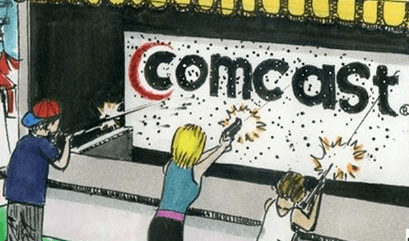 Comcast is accelerating its rollout of compulsory usage caps, adding new markets in the southern U.S. to its three-year old “trial” of what it calls its “data usage plan.” DSL Reports
Comcast is accelerating its rollout of compulsory usage caps, adding new markets in the southern U.S. to its three-year old “trial” of what it calls its “data usage plan.” DSL Reports 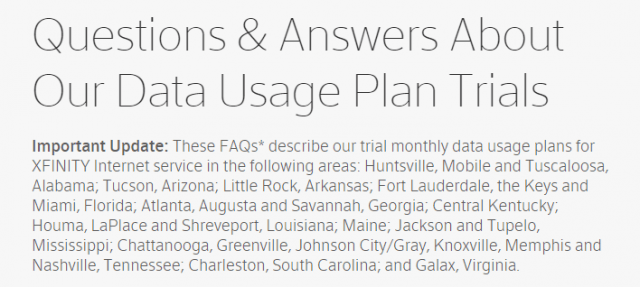 Comcast’s spreading usage caps are not popular with customers. Within hours of the news Comcast would be expanding its cap “trial,”
Comcast’s spreading usage caps are not popular with customers. Within hours of the news Comcast would be expanding its cap “trial,” 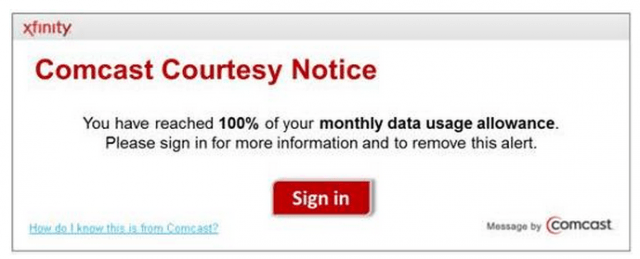 Hans says any household with kids will quickly learn Comcast isn’t being honest claiming usage caps only affect a “few customers” after they start getting warning messages injected into their web browser.
Hans says any household with kids will quickly learn Comcast isn’t being honest claiming usage caps only affect a “few customers” after they start getting warning messages injected into their web browser.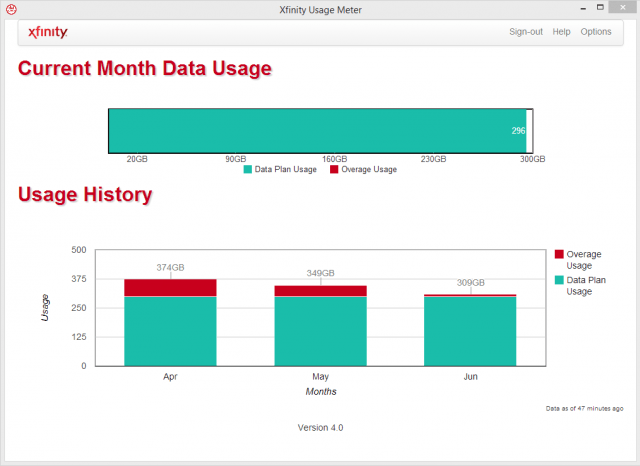 “I checked my data usage on Oct. 21 and it said I only used 162GB,” writes Sharon. “I even have [a screenshot] and saved it as I had a feeling Comcast would pull something. [On] Oct. 23, I had a pop-up on my computer that says ‘you have used 292 of 300GB’ and I went to the data usage and it shows that. Nobody in my house downloaded any huge files the past two days. So, is Comcast artificially pumping up our usage to make us go over or what? It is impossible that I only used 162GB for 21 days and then used 130GB the past two days.”
“I checked my data usage on Oct. 21 and it said I only used 162GB,” writes Sharon. “I even have [a screenshot] and saved it as I had a feeling Comcast would pull something. [On] Oct. 23, I had a pop-up on my computer that says ‘you have used 292 of 300GB’ and I went to the data usage and it shows that. Nobody in my house downloaded any huge files the past two days. So, is Comcast artificially pumping up our usage to make us go over or what? It is impossible that I only used 162GB for 21 days and then used 130GB the past two days.” Frontier Communications continues to face challenges keeping customers in its legacy copper wire service areas, where only modest investments in network upgrades have proved insufficient to stop customers shopping around for better service.
Frontier Communications continues to face challenges keeping customers in its legacy copper wire service areas, where only modest investments in network upgrades have proved insufficient to stop customers shopping around for better service. Google Fiber today
Google Fiber today 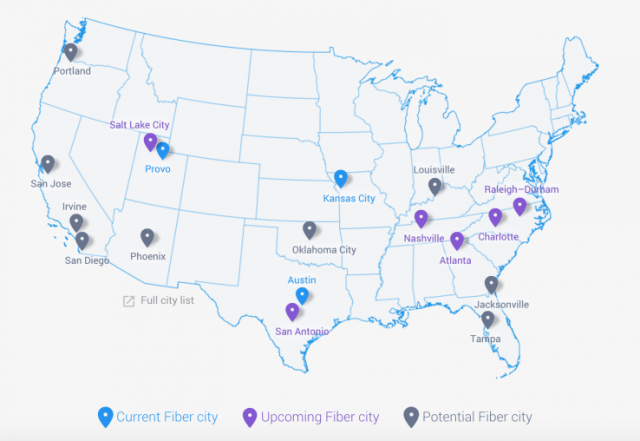
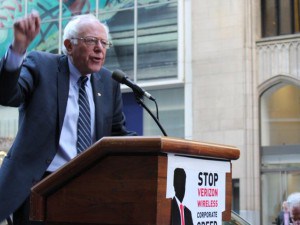
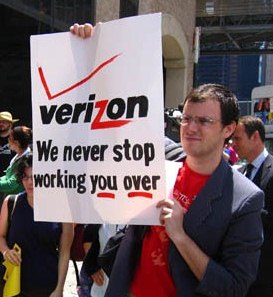 “I think Verizon needs to hear from the American people,” Sanders added. “We want them to create more broadband. We want them to pay their workers a decent wage. We want them to sit down and negotiate a decent contract.”
“I think Verizon needs to hear from the American people,” Sanders added. “We want them to create more broadband. We want them to pay their workers a decent wage. We want them to sit down and negotiate a decent contract.”